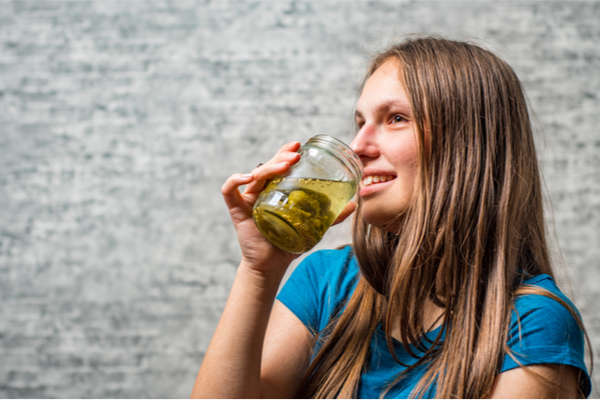Pickle juice has become a popular remedy for leg cramps over the years — specifically for the cramps runners and athletes get after a workout. Some athletes swear by it, attesting that yeah, pickle juice really works. Still, some skeptics have doubted that pickle juice relieves leg cramps at all, and there’s really no solid scientific reason yet proving just how it works, so some write it off as a placebo effect. On the other hand, some research suggests that pickle juice is way more effective than a placebo, even if it’s still unclear why.
One longstanding theory for how pickle juice works is its sodium content. The juice contains salt and vinegar, which may help replenish electrolytes. And, while it hasn’t been proven yet, researchers posit that pickle juice may help cramps by triggering muscular reflexes when the liquid contacts the back of the throat. This reflex shuts down the misfiring of neurons in muscle all over the body, and “turns off” the cramping feeling. It’s thought that it’s specifically the vinegar content in pickle juice that does this. Still, more research is needed to prove if this is exactly how pickle juice works to prevent cramps.
While there are no studies proving that pickle juice doesn’t work, or that it’s a placebo, more research supports that it does really relieve symptoms. In studies where pickle juice was effective for muscular cramps, researchers used about 1 milliliter per kilogram of body weight. For the average study participant, this was somewhere between 2 to 3 fluid ounces.
To use pickle juice for muscular cramps, measure out the pickle juice and drink it quickly. Taking a rough “shot” is also acceptable. You can use pickle juice from store-bought cucumber pickles or safely fermented homemade pickles (it doesn’t matter if it’s pasteurized or not), whichever works for you. Just make sure the natural vinegar acids and salts are present. Because it’s thought that cramp relief comes from the vinegar specifically, avoid watering the juice down. Drink it raw and experience the taste. This might not be fun for you if you can’t stand that pickle-y feeling going down, which begs the question: does it have to be pickle juice?
The simple answer is, yes and no. Pickle juice has been unique and popular in the way it helps with muscle cramps. Thus far, there haven’t been many other natural foods or remedies to rival it. However, foods of a similar vein (like sauerkraut juice, kimchi juice, apple cider vinegar, or even kombucha) haven’t been studied as much as pickle juice for cramps, and they could be just as good.
But could you eat a pickle and have the same effect? Scientifically speaking, maybe. As researchers supposed in their 2010 study, the cramp relief may have more to do with the vinegar content. If you eat a pickle brined with vinegar, it might also work. Just know that eating a pickle isn’t as well-studied as drinking the juice.
While Pickle Juice may be helpful for cramping, does it take the place of good old H2O? Some doctors and health professionals warn that pickle juice could possibly worsen dehydration. They say it curbs thirst when you drink it, but doesn’t rehydrate like water. But contrary to these statements, according to both a 2010 and 2014 study, pickle juice won’t dehydrate you, and it doesn’t curb thirst. And a 2013 study claimed it’ll also rehydrate you just as much as water.
What should you believe? Well, everything in moderation. If small amounts are taken — such as 2 to 3 fluid ounces occasionally — there should be little to no health or dehydration concerns.
Some other health caveats: pickle juice tends to have a lot of salt, and is thus high in sodium. People with high blood pressure and those who are watching dietary sodium may want to be careful not to take too much pickle juice and use it only occasionally. Pickles, especially homemade, have high levels of probiotics for gut health and immune system function, but be careful taking it if you have digestive ailments or disorders. Some pickle juices are high in acetic acids, which can worsen certain symptoms.
The verdict so far is that pickle juice can work for leg cramps after exercise. Though there isn’t a whole lot of research on it, the studies so far are quite supportive. Use of pickle juice to occasionally get rid of cramps post-exercise should also generally be quite safe, but if you have any concerns, talk to your healthcare provider before using it.
—
Photo Credit: siamionau pavel / Shutterstock.com
